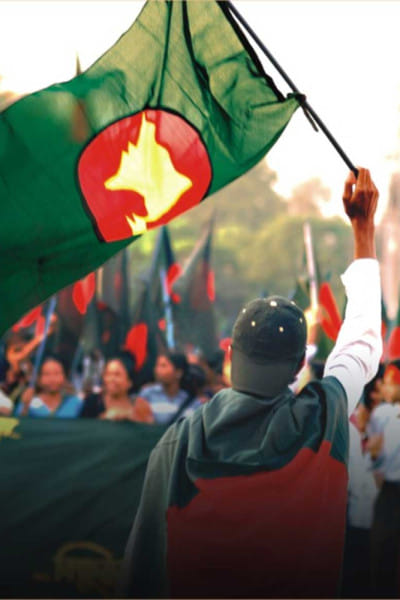Understanding the spirit of the Liberation War

In recent times, there have been many discussions, discourses and deliberations on "muktijuddher chetona," wherein passionate and eloquent speakers have emphasised the imperative of holding aloft the spirit of our great Liberation War. People have been given to understand that generations of Bangladeshis need to grasp and appreciate the uniqueness of our emancipatory struggle, and that in matters of public affairs, we should properly imbibe the spirit of said struggle for the democratic flourishing of the polity.
Constitutionally speaking, we have pledged "to realise through the democratic process a socialist society free from exploitation, a society in which the rule of law, fundamental human rights and freedom, equality and justice—political, economic and social—will be secured for all citizens." It would be pertinent to note that these high ideals inspired our heroic forefathers to dedicate themselves to sacrifice their lives for independence. Quite clearly, therefore, the realisation of these ideals, as incorporated in our constitution, shall realistically mean upholding the spirit of our Liberation War.
Ground realities, unfortunately, do not appear encouraging insofar as the realisation of the spirit of the Liberation War. This is so because of alleged moral failings. Many of the influentials in our society are busy making quick gains, as if that is the be-all and end-all of life. Many public figures hardly ever practise frugality, simplicity and integrity preached by our great Prophet (PBUH), although frequent references are attributed to his teachings.
The high ideals of our Liberation War have to be accomplished through the democratic process. However, the spectacle of the shocks and bruises of our democratic progression cannot escape even a casual observer. Too often, we see the temper that presses a partisan advantage to its bitter end, and does not understand and respect the other side. Such temperaments demonstrate a lack of feeling of unity among all citizens. It is taking us a painfully long time to appreciate that democracy depends upon the habits of consent and compromise, which are also attributes of mature political societies. Sadly, as the spirit of moderation is in short supply, our society runs the risk of degenerating into divisions with hatred, replacing goodwill.
One may want to ask if the Liberation War's spirit has taught every class of citizens to put the nation above the individual, group or party. Do we witness a change from privilege to talent and from accident of birth to emphasis on calibre? Has money been regarded as something to be earned, rather than to be inherited or won? Do we understand that there is no substitute for knowledge and integrity in public life? Have we been able to ensure the appointment of persons to high public offices on account of what their merits are, and not because they represent a particular interest or region? The desirable course of action related to these queries can truly guarantee the proper imbibing of the spirit of the Liberation War.
It is, indeed, unfortunate that many public leaders in their parlance exhibit the arrogance of power—the exact opposite of the unfeigned humility of great leaders. Some among them have the delusion of infallibility, while some others appear to be under an oath never to become wiser. The conduct of some is still prone to be governed by emotions rather than by reason. Surely, such a state of affairs runs counter to the spirit of the Liberation War.
There is no doubt that the unflinching devotion to patriotism and unbounded love for the motherland prompted our brave freedom fighters to forsake worldly pleasures and possessions. No wonder that the freedom fighters have been portrayed as the greatest children of the soil—and rightly so, because they embarked on a dangerous course of action without any expectation of gain. Viewed in this light, the unseemly use of freedom fighter identity for irregular material favours demeans the hallowed memories of the greatest children of the soil. The delay in compiling an authentic and complete list of freedom fighters is another deficit that has pained the nation. Surely, the spirit of our Liberation War would demand corrective actions so that, for the generations to come, our struggle for freedom and the contributions of the freedom fighters remain a prized memory.
The realisation of the spirit of the Liberation War must make us appreciate that we cannot live by the gross national product alone. The quality of life is far more important, and this quality is determined to a large extent by the availability of the basic human rights and civil liberties, which are enshrined in the chapter on fundamental rights in our constitution. Without those rights, the quality of life would be gravely impaired. While making endeavours to raise the standard of living, we must understand the significance of the standard of life. In so doing, we can be expected to correctly imbibe the spirit of our great Liberation War.
Muhammad Nurul Huda is a former IGP of Bangladesh Police.

 For all latest news, follow The Daily Star's Google News channel.
For all latest news, follow The Daily Star's Google News channel. 



Comments